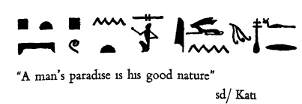Born New York, USA (1942), lives and works in Philadelphia, USA
Artist’s statement:
“A person’s good nature is her or his paradise, and often he or she has no other.”
—Ezra Pound, “Canto XCIII,” line 1, translation of The Maxims of King Kati.
Rather famously, Guy Davenport and Benjamin Urrutia jointly did a translation of the sayings (Logia [sin. Logion]) of Christ. In the Prologue to their 1996 booklet, The Sayings of Jesus: The Logia of Yeshua, Davenport, in his prologue, mentions the saying. When I was talking to the fact-checker at the New Yorker (a young man named Ishmael) about their recent article on me, he looked up the comment and discovered its original was in Ezra Pound’s Cantos, specifically “Canto XCIII,” line 1, which far predates Jesus and goes back to King Kati:

—from Pound’s Cantos.

—from Cookson’s A Guide to the Cantos of Ezra Pound (Anvil, 1985)
In that particular time and culture, women were thought of as property, not people.
This is my personal restatement of the logion for today.









